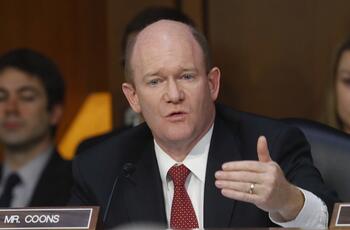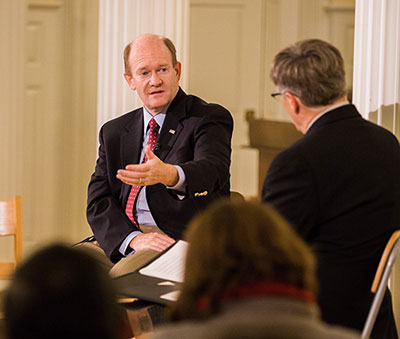By Emily Judd ‘19 M.A.R.
Religion can be a healthy part of politics and Democratic politicians should speak up more publicly about their faith, said U.S. Senator Chris Coons ‘92 M.A.R. in the latest Yale Divinity School podcast episode.
 Coons, a graduate of Yale Divinity School and Yale Law School, said religion has played a positive role in his own political career, citing a weekly bipartisan Senate prayer breakfast that attracts 12 to 24 senators each week.
Coons, a graduate of Yale Divinity School and Yale Law School, said religion has played a positive role in his own political career, citing a weekly bipartisan Senate prayer breakfast that attracts 12 to 24 senators each week.“In those hours, I have heard more and learned more about the motivations, the hearts, the families of my colleagues than anywhere else,” Coons said in his interview with the YDS “Quadcast.”
“It’s awfully hard to throw a punch at someone, at least rhetorically on the floor of the Senate, when you’ve held hands with them in prayer in the morning,” he added.
According to Coons, Democratic politicians tend to keep their religious beliefs private for a variety of reasons, including concern that public religiosity is only for political conservatives, as well as the desire to promote inclusion of nonreligious people.
Coons said he has directly encouraged Democratic colleagues to speak publicly about how their religious values shape their politics. “I’ve tried to model for my colleagues how it is possible to recognize, respect and welcome people, colleagues, constituents who are agnostic or atheist…while also speaking freely about or witnessing your own faith experience,” he said.
Bridging the political divide
Coons started his political work as a Republican, campaigning for Ronald Reagan in his youth and co-founding the Amherst College Republicans group, before making the switch to the Democratic party.
As someone who has been on both sides of the political aisle, Coons said he sees three areas of potential collaboration between Republicans and Democrats: expanding national service programs like AmeriCorps, investing in infrastructure, and combating climate change.
Last year, he co-founded the bipartisan Senate Climate Solutions Caucus with Republican Senator Mike Braun of Indiana. The caucus is made up of 14 senators including Republican Senator Marco Rubio of Florida and Democratic Senator Jeanne Shaheen of New Hampshire.
“All of us recognize climate change is real, caused by people, by human activity, and we have to act to address it. Even a few years ago, you would have never seen a group that large and that bipartisan agreeing on those core points,” said Coons.
Coons is also bridging the political divide in a bill he recently introduced with Republican Senator John Cornyn that would fund and advance the teaching of civics in American schools.
“We’ve attracted a very broad bipartisan group to co-sponsor this bill because whether you’re Elizabeth Warren or Ted Cruz, senators here with whom I work still believe that if more Americans understood the foundations of our system, if they understood the structure and the balance and the beauty of what the framers did – their perspective would win out,” said Coons.
When asked what legislative change he would make in the United States if he had the power, Coons said he would amend the Constitution to include a right to vote.
“Everywhere within our Constitution, it implies the right to vote, it assumes the right to vote, but in the Bill of Rights, it is not spelled out that you have a right to vote. And voter suppression is a very real thing in our nation,” he said.
Yale memories
Coons remembers two eye-opening experiences during his time at Yale. When the first Gulf War was launched in the Middle East, Coons said there was a “really vigorous” debate about just war theory at Yale Divinity School.
 “There were a number of folks who were attending the Div school at that point who were military… There were others who, either by virtue of being Quakers or from some of the more peace-oriented denominations, were scandalized by the idea that we as a community would speak out in any way in support of war,” said Coons.
“There were a number of folks who were attending the Div school at that point who were military… There were others who, either by virtue of being Quakers or from some of the more peace-oriented denominations, were scandalized by the idea that we as a community would speak out in any way in support of war,” said Coons.“It was one of the vigorous, open, and, frankly, constructive conversations I remember,” he added.
He also fondly remembers a semester internship with Downtown Cooperative Ministries in New Haven, whose longtime director was Samuel Slie ‘52 B.D., ‘63 S.T.M. and whose co-founder was Nancy Jo Kemper ‘67 B.D.
Two projects in particular—a Thanksgiving dinner for people experiencing homelessness in New Haven and a Stations of the Cross in support of peace in the Middle East—made a long-lasting impact on Coons.
“It was so inspiring,” he said, “that if I had not already been committed to a nonprofit in my hometown of Wilmington, I may very well have stayed in New Haven to continue with Downtown Cooperative Ministry.”
Emily Judd ‘19 M.A.R. is a journalist based in the Middle East, covering religion and politics. Her work has been published in leading outlets including The Associated Press, the Huffington Post, and Al Arabiya. In addition to her Yale M.A.R., she has a master’s degree in journalism from Georgetown University.
January 13, 2021